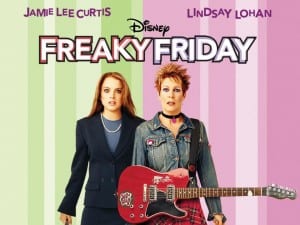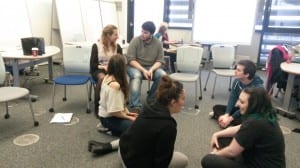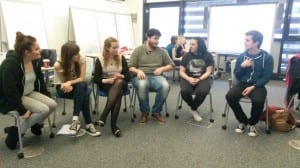What it is to be an adult has been a big topic to many of our team at this point of our life, as at the end of this academic term we will be out of education and off into the big wide world to go and get a ‘real’ job. It came apparent that we all had different ideas about what it is to be an adult, depending on what we have done through our lives and how we have experienced big birthdays, hitting the legal ages for things, becoming a teenager and no longer being a teen. Forefront Theatre looks to explore how an adult is identified, and how people at different points of their lives and ages define an adult.
Something that highlights the two sides of adulthood, that of a young adult trying desperately to be older than they are and the mature adult that is inundated with the tasks of being a full time adult, a parent, having a career, paying bills, ect, is the film ‘Freaky Friday’. Though a comedy film it manages to highlights these two types of people very well and the struggle between the wide generation gap, in the movie and full time writer and psychologist mother Tess and her teenage daughter Anna, a young girl wishing to grow up and star her music career, fight continuously. Tess wishes her daughter would stop trying to rebel and grown up, Tess doesn’t understand how hard school is and how passionate she is about music, whereas Anna is constantly saying that Tess needs to relax and stop trying to be a control freak this would allow her to spend more time with Anna. They end up by the use of magic swapping bodies and having to spend the in each others life’s. They experience how hard the other ones life is, this greater understanding allows them to do something meaningful for the each other and they eventually swap back.

This movie really highlights the difference between children always wanting to grow up and adults wishing they could be children again as they overwhelmed by the responsibilities they have to take on. In response to this we had a couple of ideas for our piece, the first being inspired by a Haribo advert:
It takes children’s voices and opinions on the sweets but lip-synced by adults to show that the sweets are still enjoyed across ages and can make you feel like a big kid. We decided that we will interview children between the ages of 5-13 and ask them what it is to be an adult then using these responses we will have a scene where we replay then and lip-sync. This should allow us to highlight the difference in what we think being an adult is when we are young and what it actually is when we become one.
As we really liked these two views we decided to collect pictures of the Forefront company when we were children and use it as part of our marketing, on the blog it would become our background and also as part of our poster campaign.
Another scene idea that came from these views was the using lyrics, film and books quotes to create a conversation between a child and an adult, one showing their excitement to be an adult and all the benefits of it, the other talking about how being an adult isn’t all it was cracked up to be and how they wish they could be a child again.
YouTube, (2015). New Haribo Starmix Advert 2014. [online] Available at: https://www.youtube.com/watch?v=9scm3NCIH_E [Accessed 18 Feb 2015].
-Hope

